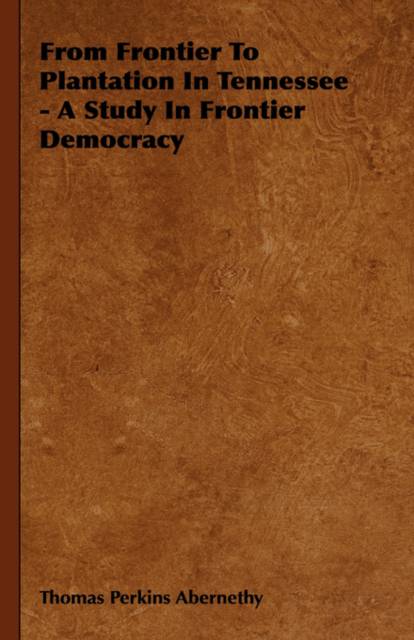
- Retrait gratuit dans votre magasin Club
- 7.000.000 titres dans notre catalogue
- Payer en toute sécurité
- Toujours un magasin près de chez vous
- Retrait gratuit dans votre magasin Club
- 7.000.0000 titres dans notre catalogue
- Payer en toute sécurité
- Toujours un magasin près de chez vous
From Frontier To Plantation In Tennessee - A Study In Frontier Democracy
Thomas Perkins Abernethy
Livre relié | Anglais
59,95 €
+ 119 points
Format
Description
FROM FRONTIER TO PLANTATION IN TENNESSEE- A STUDY IN FRONTIER DEMOCRACY by THOMAS PERKINS. Originally published in 1932. PREFACE: Narrative histories of the United States give but a fragmentary idea of the development of Jl democracy in this country. This is due primarily to the fact that our Federal system is a government of limited powers, and its activities touch the lives of the people at only a few points. Narrative histories of the individual states, on the other hand, have ordinarily dealt with local politics in a local way. Science is studied by the examination of specimens, and general truths are discovered through the investiga tion of typical forms. History has been studied mainly by national units, and the field is too broad to allow of minute examination. It would seem, therefore, that the study of a single state, not with an eye to its local politics but concentrating on its development as a com munity, should throw new light upon die growth of our democracy. For the purposes of such a study, Tennessee offers unique advantages. It was the first state to undergo the territorial status, and was without precedent to guide it on its way. Its boundaries include the earliest organized transmontane settlements. The frontiersmen planting these settlements were therefore shackled neither by powerful precedent, nor crystallized opinion, nor petri fied institutions in developing their community life. Not only were these settlements planted under striking con ditions, but they were established under famous leaders. Certainly the frontier history of no western state is richer or more significant than that of Tennessee. It is also important for the purposes of this study that the forms of economic life to be found during the ante bellum period were varied. The state was a part of the West and a part of the South. Its eastern section had a self-sustaining, small-farmer population. Its Cumberland basin was largely a grain-growing, stock-raising area, while its western section was, in all respects, a part of the cotton kingdom. It therefore affords a rare oppor tunity to study the political effects of these several types of agricultural economy. Land was in the early days the chief form of wealth in the United States, and Tennessee is almost unique among western states in having had a land problem of her own. The laws passed in disposing of the public domain constitute the most significant economic legisla tion with which the state government had to deal, and through such legislation may be tested the living pulse of the body politic. We have been accustomed, in studying our history, to pay too much attention to what the politicians have said and too little to what they have done. It is possibly accidental, yet no less significant, that Tennessee furnished far more than her due share of the leaders of that western democracy which grew in importance so astoundingly between the outbreak of the Revolution and the War of Secession. The activities of these men in the politics of the state give its history an importance and a significance which it would otherwise lack. Taken together these factors render Tennessee an admirable spedimen for such a type study as that which is here presented. Periods of changing conditions have been given special attention static periods have been passed more rapidly in review. An expression of appreciation is due to Professor Ulrich B. Phillips, of Yale University, for valuable suggestions, and to Professor J. B. Sanders, of the University of Alabama, for a critical reading of the manuscript. It is fitting that I should acknowledge here my indebtedness to Ida Robertson Abernethy, my wife, who edited and typed the entire work. THOMAS PERKINS ABERNETHY THE UNIVERSITY OP VIRGINIA DECEMBER, 1931
Spécifications
Parties prenantes
- Auteur(s) :
- Editeur:
Contenu
- Nombre de pages :
- 416
- Langue:
- Anglais
Caractéristiques
- EAN:
- 9781443721646
- Date de parution :
- 04-11-08
- Format:
- Livre relié
- Format numérique:
- Genaaid
- Dimensions :
- 140 mm x 216 mm
- Poids :
- 675 g

Les avis
Nous publions uniquement les avis qui respectent les conditions requises. Consultez nos conditions pour les avis.






